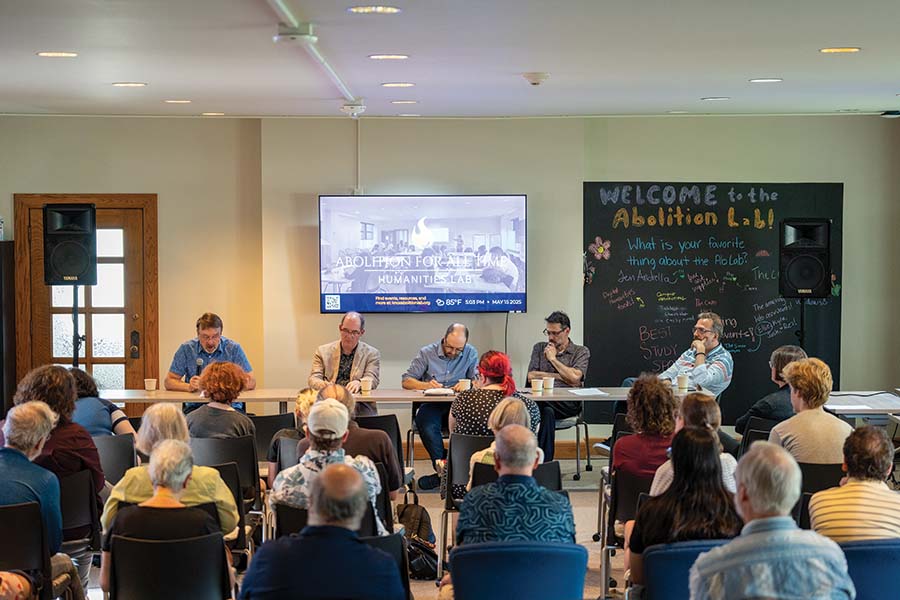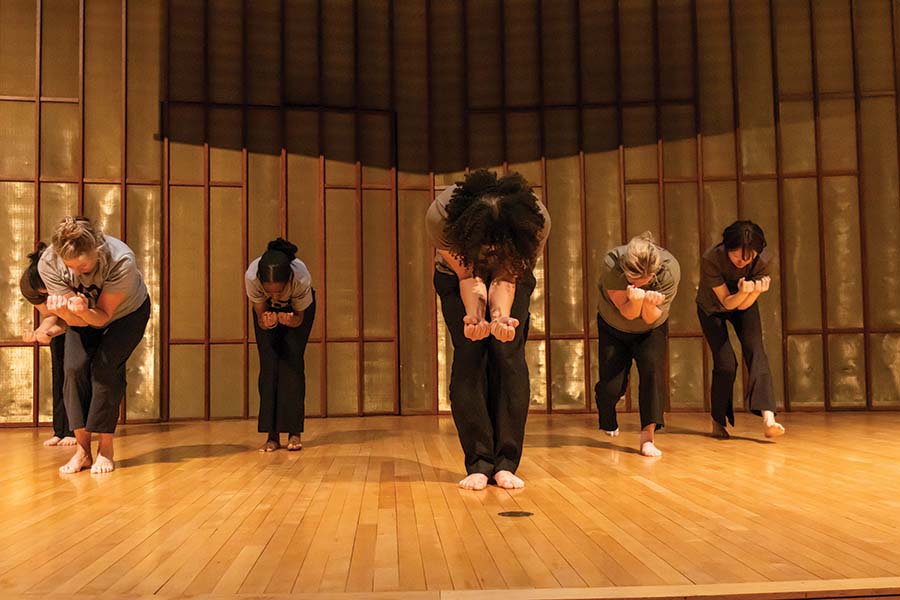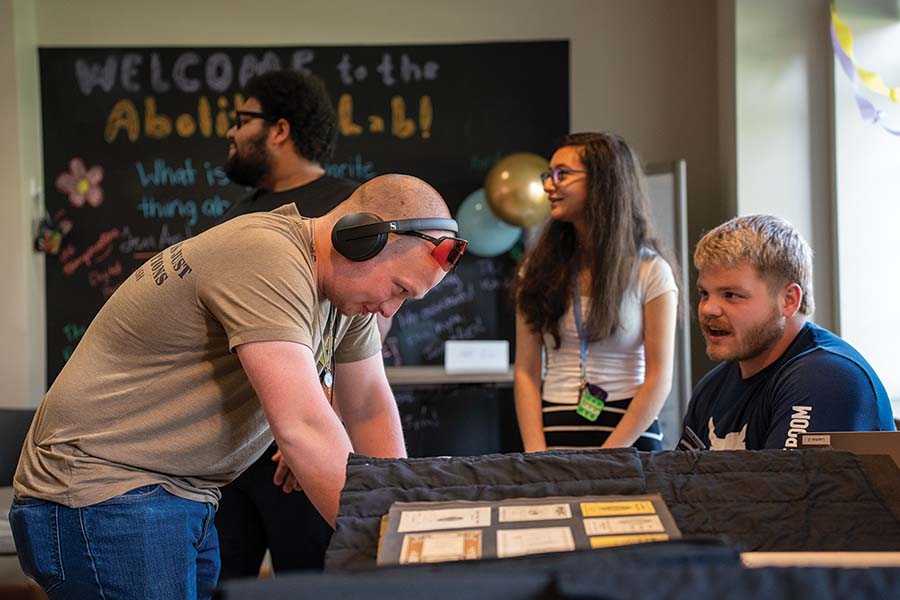In 2022, Knox received a $1.2 million, three-year grant from the Andrew W. Mellon Foundation to fund various research and archival courses and projects to develop a greater understanding of historical and contemporary social justice issues. Former Provost and Dean of the College Michael Schneider introduced the grant as challenging Knox faculty and students to “to question how faithfully we have pursued the activism of our founders and, more importantly, what should be the focus of our educational mission, in light of that activist legacy, today and in the future.”
Three years later, the grant has not only helped create a physical and figurative space on the Knox campus for learning, guiding, empowering, and holding accountability, but has also reinvigorated interdisciplinary collaboration at Knox and beyond.

Putting the Grant to Work
The Mellon Foundation grant supported experimentation with new courses and programs, aided faculty mentorship of students, and helped establish the “Abolition for All Time” Digital Humanities Lab (Abolition Lab), through which all projects were filtered. The goal of the Abolition Lab was to create opportunities to support and encourage learning about the history of abolition at Knox College and explore how the past can serve as a guiding light for social justice and activism in the present and future.
“Abolition is the lens through which we are focusing our goal because it can help us show students why the humanities matter—that humanities education teaches us what matters so that we are empowered to make change in the world,” said Associate Professor of History Danielle Fatkin, who managed the grant as Associate Dean for Faculty Affairs during its first two years.
Fatkin worked with Jen Andrella, who served as the Andrew W. Mellon Postdoctoral Fellow in Digital Humanities for the duration of the grant and oversaw the lab and its projects. Andrella worked directly with faculty members who sponsored and worked with students on projects, showing faculty and students how to implement digital skills and methods into their research. She also showed faculty how to implement digital humanities into their coursework, key components of the Abolition Lab projects.
Staff members in the Seymour Library, Vovis Center for Research and Advanced Study, and the Kleine Center for Community Service were also frequent collaborators on projects.
“Jen and I worked together to develop the [Abolition Lab] space. The library staff was working to move the reference section into the general section, and it opened this huge space,” Director of Seymour Library Anne Thomason said. “We planned the software and hardware requirements, the podcasting studio, and the modular furniture that has helped make it a popular space to congregate. We want it to be and remain a space for faculty and students to come together and talk as well as introduce different interdisciplinary programming works for many years.”
Year One of the Abolition Lab had a strong start as 69 students from five different classes worked with Andrella. In December 2022, the Lab hosted a conference, Making Knox: The Anti-Slavery and Abolitionist Aspirations of a Midwest College. During the two-day workshop, participants learned about the founding of Knox, past definitions of abolition, and why it matters today. Christian Ayne Crouch of Bard College and John F. Bell of Assumption University served as the keynote speakers.
The Abolition Lab also fostered a partnership with Oberlin College, Grinnell College, and Colorado College to better understand the history of abolition and social justice at each institution. The schools laid the groundwork for the April 2025 Abolition for All Time Conference held on the Knox campus.
“
Abolition is the lens through which we are focusing our goal because it can help us show students why the humanities matter.
—Associate Professor of History Danielle Fatkin
In the second year of the Abolition for All Time grant, the focus shifted to innovation with the goal being to help faculty engage students in new ways. During the 2023-24 school year, Lab usage increased with 126 students participating. In December of that year, Knox held a workshop, Lessons in Liberation: Contemporary Abolition and Knox College in the 21st Century, led by faculty who explored modern abolitionist projects and their relevance to the College and its core beliefs. Erica R. Meiners, Bernard J. Brommel Distinguished Research Professor at Northeastern Illinois University, gave the keynote speech of the conference.
Faculty members were given tutorials on the various equipment and resources available to better understand the equipment students would be using.
“We’ve been able to work with more and more faculty. These tools take time to understand. People need to know what options are available. It’s been a gradual process, but I’ve seen increased growth from year one to year two,” Andrella said.
Thanks to a strong partnership with the library, the lab’s new space in the former Reference Room served as a space for workshopping projects and ideas. The Abolition Lab features monitors on the wall, allowing presenters the opportunity to share research digitally and reach a wider audience. Various presentations and discussions were hosted in the space over the last two years.
“I think the space itself is the most important part of the lab in general,” said Associate Dean for Faculty Affairs Ole Forsberg, who managed the grant during its third and last year. “The fact that there’s space on campus where faculty members can be drawn together to meet and talk about cross-curricular topics that touch them all. A space to talk about humanities, which is the core of a liberal arts education, and how humanities are expressed in every disciple—that is the key to the success of the lab. I don’t see that going away.”
As the Lab moved into its third year, it hosted a faculty development workshop in December 2024, called The Future of Abolition. The goal of the workshop was to embrace the future of abolition and discuss what that means. The workshop featured required readings that accompanied and spearheaded discussions throughout the program. The last year also featured a full-scale conference on the Knox College campus to showcase the work done during the grant’s three-year duration.

Celebrating Abolition For All Time
This past April, Knox celebrated the fruits of the Mellon Foundation grant, hosting an Abolition for All Time conference. The conference brought together past and present faculty, staff, students, institution partners, and community collaborators to showcase their work. The conference united students and faculty from Knox and other colleges in the Midwest that participated in abolitionist research and projects.
Research covered by the lab not only branched into the various humanities disciplines, but also into the sciences. Associate Professor of Biology Nick Gidmark brought a scientific perspective to the discussion. His work within the Abolition Lab focused on bringing a 3D modeling software called Maya, which is typically used in biology to model organisms for creative digital storytelling. This served as a means to open educational resources for the rest of the campus. Gidmark displayed his project at the Abolition for All Time conference.
“The kind of foundation and conception of the Abolition Lab was to bring diverse people together from different corners and get them to talk in the same way a science lab does,” Gidmark said.
Students from the dance program also participated in the conference by choreographing performances to promote social justice and the narratives of histories that have been suppressed, providing a platform for marginalized communities to claim their agency. “Working with an ensemble this year, I realized it was the perfect opportunity to integrate my students into the world of origin and the Abolition Lab,” Associate Professor of Dance Kathleen Ridlon said.
Phyllis-Anne Kuteesa ’26, a performing student, appreciated being able to participate in this project.
“I had a beautiful opportunity to collaborate with my professor and to tell the story of the generations before me,” Kuteesa said. “Technique aside, this piece asked me to listen and understand where this music was coming from.”
The conference ended with notes on the future of the Abolition Lab, including round table discussions and audience conversations. “The Abolition Lab is not where Knox started, but it is opening doors to where Knox is going to go,” said Kari Santos, administrative assistant to the associate dean for faculty affairs.
Work in the Lab continued after the conference. In one of the spring term’s final presentations, students blended old technology with new, combining late 19th and early 20th century forms of social media with 21st-century technologies. Students took historical scrapbooks from Knox’s Archives and Special Collections and used them to produce a podcast episode with an accompanying digital exhibit using Microsoft Sway. The presentations were held in the Abolition Lab in Seymour Library.
“
The kind of foundation and conception of the Abolition Lab was to bring diverse people together from different corners and get them to talk in the same way a science lab does.
—Associate Professor of Biology Nick Gidmark
The Future Remains Bright
The grant may have expired, but it is not the end of Knox College’s Abolition Lab, as future projects and proposals continue.
“While this conference serves as the culminating celebratory event for the Mellon Foundation Humanities for All Times Grant that launched the Abolition for All Time Digital Humanities Lab in 2022, the Lab lives on,” former Provost and Dean of the College Mike Schneider, said during the Abolition for All Time conference in April. “We still have some exciting grant news to share with our colleagues.”
Provost Schneider announced at the end of spring term that the school is accepting proposals for the final round of grant opportunities for the Mellon Faculty Innovation Grants for 2025. Faculty can create proposals for the grants to develop future curriculum.
The purpose of the grant funds is to continue the Abolition for All Time Lab ideals and advance academic programs. All faculty members were eligible to apply, and there is no limit to project proposals.
“During the Fall Term, we have these Faculty Innovation Grants that are still tied to the original Mellon Grant. We’ve got a dozen or so faculty taking advantage of those,” Forsberg said. “As for the Abolition Lab, the faculty love the space, and the students love the space. It is not going away.”
Other goals of the grant are to continue Knox’s efforts to provide innovative programs, educational opportunities for students, student engagement with key social and ethical issues, faculty development opportunities, and preparation for student success after Knox, as well as opportunities to develop future curricula that highlight the College’s vast array of student educational opportunities and experiences.
“The faculty can take classes to the Abolition Lab to learn to use the space, to use the materials that are offered there. It seems to me that the faculty-to-faculty interaction is the hallmark of what we’ve taken away from The Lab,” Forsberg said. “For instance, Nick Gidmark in biology is working on a project with someone in the social sciences, and that doesn’t happen unless there is a central place for everyone to get together.”
To help ensure that the Abolition Lab continues to connect students and faculty across disciplines, Knox recently hired a full-time digital scholarship coordinator to oversee the Lab. While the Mellon Foundation grant may expire, its original mission and purpose not only will continue, but will also grow into the future.
“It’s an exciting space. The faculty need a space to talk and get together and the lab now plays that part,” said Thomason, who will supervise the new digital scholarship coordinator. “I think that’s why Provost Schneider used the name ‘Abolition for All Time’ for the grant. It’s not something that is only here for three years, but will be here for years to come.”

Over the three-year grant period, the Abolition Lab produced 38 digital projects and 55 class collaborations and reached 739 students, more than 50 faculty members, and four liberal arts colleges.
Projects included:
Course Projects
- The Scraps of Time Podcast
- Intro to GIS Story Maps
- The Black Arts Movement at Knox
- Visualizing Human Rights
- Theatre & Incarceration Project Showcase
Collaborative Faculty Projects
- Abolition and the Arts
- Displaced Voices: Stories from the Prairie
- Supporting Innovation in Classrooms at Knox
- 3D Structure for Scientific Storytelling
- Towards an Abolitionist Model of Media Literacy
- Reimagining the Humanities in the 21st Century
- Ethics in Healthcare Inequality in Rural America
- Knowledge in Business Ethics
- Abolition of Detention
Inter-Institutional Projects
- Regional Reconciliation: Situating the Southwest and Colorado College
- “That’s my tree”: Visualizing the Grinnell College legacy of Edith Renfrow Smith ’37, DHL ’19
- Japan Meets Midwest America: Overseas Students, Teachers, & Missionaries 1860s–1920s (Colorado, Grinnell, Knox, and Oberlin Colleges)